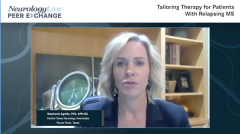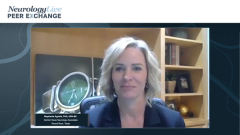
Overcoming Treatment Challenges in Relapsing MS
The rationale for early treatment of multiple sclerosis, and an overview of limitations that impact the management of relapsing multiple sclerosis.
Episodes in this series

Transcript:
Bryan Walker, MHS, PA-C: Stephanie, you brought up a great point there, and this is trying to decide which is going to be the right one for us. And certainly, we want to rely on data as much as possible. But I believe that all of us here have been treating patients living with MS [multiple sclerosis] for a sufficiently long period of time, where we’ve had patients over the years do really well with some of the older medications, like the interferons; and they’ve remained clinically and radiographically stable for a long period of time. How do you figure out what’s going to be the right medication for the right patient? That’s often difficult, regarding what Pat was saying before, our lack of biomarkers to indicate, “Hey, this might be the right mechanism of action for you, and not for the other one.” I totally agree. Our landscape has changed, and you want to be as assertive as possible with your treatment paradigms, and certainly, making decisions based on what the risk tolerance of the patient is. But gosh, I can’t help but think back to some of those patients who have been on an interferon or glatiramer for 12, 13, 15 years and have not had a relapse.
Stephanie Agrella, PhD, APN-BC: I totally agree, Bryan. I have a sneaking suspicion you all will agree, if someone is on one of those therapies and they’re doing well clinically, radiographically, we’re certainly going to stay the course. There’s no reason to change that person. And I know sometimes they hear about the newer therapies that are out there, and they always look a little bit shinier because they are newer. But then when we talk to our patients, and we really discuss where you are, how you’ve been doing, and changing courses, what’s that going to bring into the potential risk pool here, most times, as long as they’re tolerating the therapy and they’re doing well on it, I try to stay with what they’re on at that time. And frankly, most times, they’re pleased about that, too. It’s an opportunity for us to remotivate them as well, and just say, “You know what? This is working great for you. We don’t need to take any other risks; we don’t have to assume any unknowns; you already know how you tolerate this, let’s just stay the course.” It’s a great question. And again, you bring up the good point that Pat mentioned earlier about biomarkers. Boy, when that becomes available, it’s going to be so helpful. In the meantime, we’re just going to continue to use our clinical expertise, our ability to educate our patients, and then really, together, come to an informed decision.
Amy Perrin Ross, APN, MSN, CNRN, MSCN: Stephanie, you mentioned something early on in your comments about the lack of an algorithm. And that’s a double-edged sword. Lots of us would like an algorithm to follow. It would make our lives much easier. But as we know, our patients with MS don’t generally follow algorithms. There are some algorithms available. For example, in the United Kingdom the NICE [National Institute for Health and Care Excellence] guidelines provided an algorithm. And in some respects, it’s helpful, and in some respects, that’s restrictive. I’m not so sure, particularly as we increase the number of disease-modifying therapies and the various different mechanisms of action, that an algorithm is something that I want. But the last comment that I’d like to make that has been an underlying point in this whole discussion is, it’s not just us making these decisions. We’re making recommendations. And certainly, you’ll agree, that as advanced practice providers, we all focus on the whole concept of shared decision-making, because if the patients aren’t buying in to what we’re selling, it doesn’t really matter. It’s like when you go to the grocery store, and buy whatever the lady is sampling, and you get it home and never eat it. Nice idea, but it doesn’t work.
Thank you all so much. I would like to thank this wonderful panel, Christen Kutz, Stephanie Agrella, Bryan Walker, and Patricia Melville, for this wonderful discussion. I’d like to thank you as an audience for watching NeurologyLive® Peer Exchange. If you enjoyed the content, I would suggest that you subscribe to the NeurologyLive® newsletters to receive information about upcoming Peer Exchanges and other content available to you. Thank you all so much.
Transcript edited for clarity.
Newsletter
Keep your finger on the pulse of neurology—subscribe to NeurologyLive for expert interviews, new data, and breakthrough treatment updates.

















